American food is a concept that always seems to elude diners. Whereas Chinese, Japanese and Italian are now fixtures in Taipei’s culinary scene, American food is consigned to greasy burgers and fries found in big chain restaurants like Chilis or TGI Friday’s. Either that, or it’s cute brunch places like the Diner where people go to be seen.
Noticing this paucity in authentic American food, Taiwanese-American restauranteur Eric Wang (王大洪) decided earlier this year to open a place that served New American cuisine — a somewhat healthier, more upmarket rendition of American cuisine which infuses elements of culinary traditions from other cultures.
Wang, who initially toyed with the idea of opening a Korean restaurant or a brunch place, says that the trend in the restaurant business in Taipei is to go with the grain.
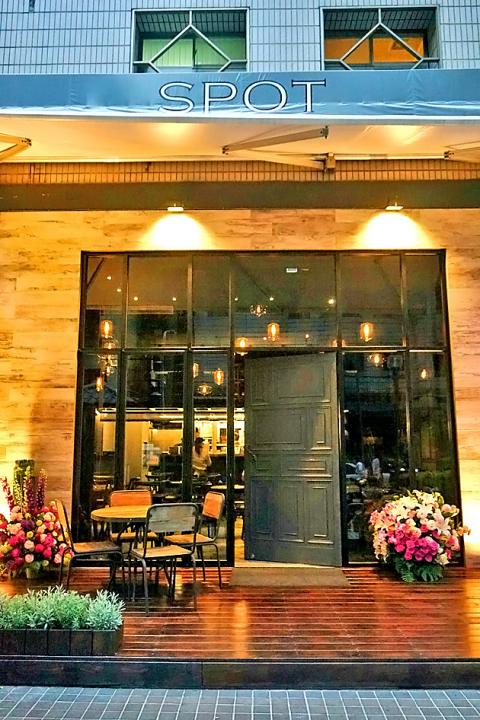
Photo: Dana Ter, Taipei Times
“When we opened Spot, our neighbors kept looking our way, and we were like, ‘don’t worry, we’re not opening another pasta shop,’” Wang says, alluding to the dozens of pasta shops in the Zhongxiao Dunhua (忠孝敦化) area where Spot is located.
The interior of Spot, which evokes a warehouse chic vibe, reflects this unapologetic attitude. Wooden chairs and tables with plush gray cushions add some warmth to the metal rails and mirrors on the mezzanine floor. Lamps dangle from ceiling chains, illuminating the restaurant like lanterns afloat in a night sky.
Wang adds that his goal is to keep the food as authentic as possible. In order to do so, he recruited Taiwanese-American chef Austin Hu (胡正威). Hu, who owns Madison restaurant in Shanghai, has been cooking New American cuisine his entire career. He trained at Gramercy Tavern in New York, where he learned his crazy customer service ethic.
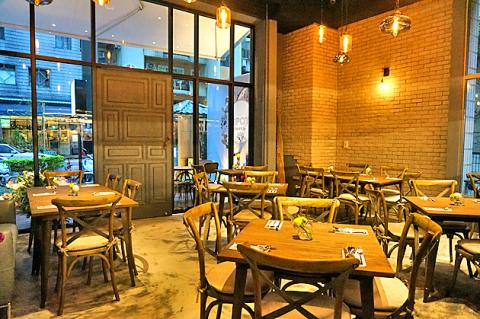
Photo: Dana Ter, Taipei Times
“People in New York know food,” Hu says. “They know what medium well is and they are assholes about it, but they’re often right.”
It’s up to the third member of the team, Taiwanese-Jordanian Khaled Abu Elsamid (艾立德), to ensure that the food at Spot maintains its high standard. Elsamid grows herbs like cilantro, chives, thyme and parsley in hydroponic rooftop farms around Taipei, some of which he brings to Spot to use in their dishes.
Thanks to Elsamid’s sourcing, Spot’s selling point is their garnishing and sauces. Whether it is spicy, tangy or savory, all the dishes have a kick to them. The smoked salmon carpaccio (NT$180) is a solid appetizer to begin with. Neither too dry nor too moist, the thinly-sliced salmon served with delicately cut cucumber is a savory seafood lover’s delight. The fried capers, dills and tiny traces of radish make for aromatic garnishing, and they complement well with the smoother textures of the salmon and cucumber. Yet it’s the citrusy yuzu cream, made from yuzu plant, which ties all the flavors together.
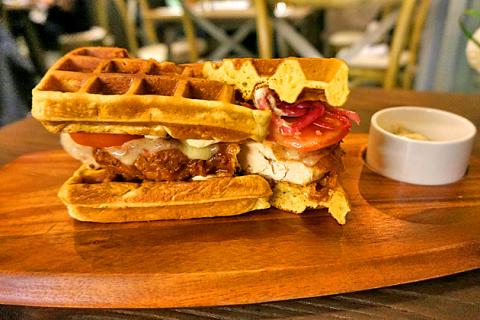
Photo: Dana Ter, Taipei Times
Citrus fruits and savory garnishing seems to be a gastronomical formula that works well at Spot. The torched sashimi (NT$295) is another appetizer that harmoniously blends both elements. Slightly burnt on the outside, warm and soft on the inside, the fresh cobia sashimi is paired with candied ginger crisps, cilantro, micro purple carrot shoots and thin slices of grapefruit. Washed over with a mild vinaigrette sauce, the dish tastes as suave as it looks.
For those seeking a classic American brunch staple, the smoked salmon benedict (NT$295) is a fine choice. Buried under layers of poached egg and runny lemon hollandaise sauce, the salmon itself is only mildly discernable, but it doesn’t matter because the rest of the composition is quite exquisite. The English muffin is warm and toasty, the hollandaise sauce has a rich, silky texture and the sprinkling of fried capers and dill add a pleasant savory kick.
The menu at Spot is also very chicken-based. That being said, a good chicken dish to sample is the chicken wings (NT$180). Spicy and crispy, the wings pair well with home-picked celery leaves. Buttery, pungent and piquant all at the same time, it’s the homemade sriracha sauce mixed with blue cheese sauce that distinguishes Spot’s chicken wings from those served in other restaurants.
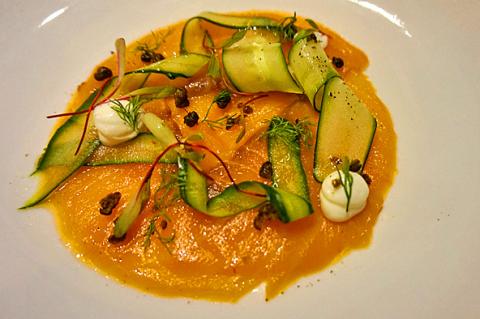
Photo: Dana Ter, Taipei Times
If the spiciness is too much to handle, the pan-roasted chicken (NT$475) is a fine alternative. Served as a half chicken breast and thigh over mashed potatoes and gravy with wilted Chinese kale buried underneath, this hearty concoction is not for the faint-hearted. Like most of Spot’s other dishes, the pan-roasted chicken, especially the skin, is a tad salty, but in an addictive kind of way. The warm gravy adds a nice touch to the palate, adding some runniness to an otherwise dry dish.
The most sinful entree is Spot’s fried chicken and waffle sandwich (NT$405). The spiced rubbed fried chicken is juicy and succulent, while the waffles boast a sweet flavor. Tomatoes and pickled onions add a zesty dimension, but it’s the salty, spicy chipotle aioli dipping sauce that really does it.
If you have room for dessert, the blueberry pancakes (NT$255) is a sweet way to top a savory evening. The homemade pancakes are soft and spongy, blending well with a food coma-inducing mixture of blueberry marmalade, powdered sugar and maple syrup.
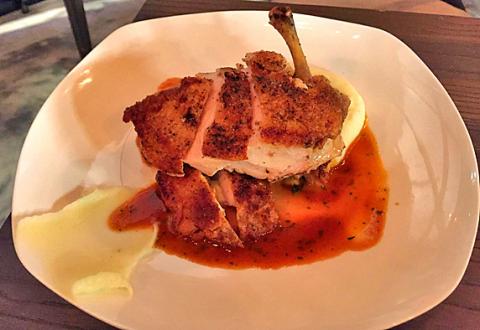
Photo: Dana Ter, Taipei Times
The spicy and savory flavors at Spot may not sit well with patrons who have a sweeter palate, but the restaurant is nevertheless a fine addition to Taipei’s modern dining scene. Wang says that during their various taste testing events, they received largely positive feedback from expat diners who made comments like “it feels like home.” Taiwanese on the other hand, had more criticisms like there were too many flavors or that the food wasn’t sweet enough.
Hu is optimistic though — “Taiwan by nature is an open-minded society, so we’re confident that there’s room for a New American restaurant to do well,” he says.
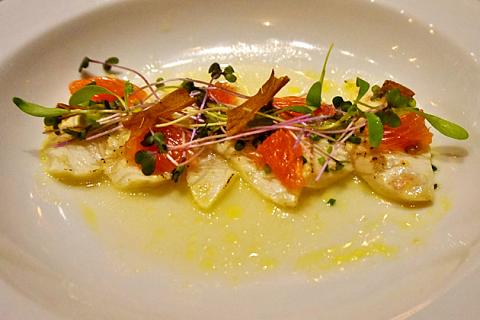
Photo: Dana Ter, Taipei Times
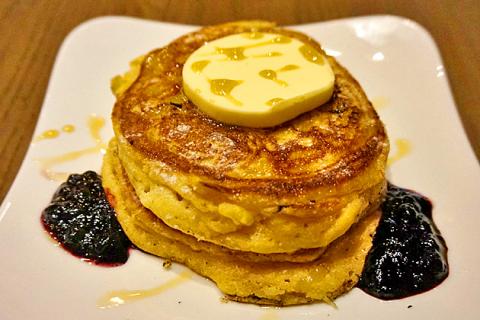
Photo: Dana Ter, Taipei Times

Most heroes are remembered for the battles they fought. Taiwan’s Black Bat Squadron is remembered for flying into Chinese airspace 838 times between 1953 and 1967, and for the 148 men whose sacrifice bought the intelligence that kept Taiwan secure. Two-thirds of the squadron died carrying out missions most people wouldn’t learn about for another 40 years. The squadron lost 15 aircraft and 148 crew members over those 14 years, making it the deadliest unit in Taiwan’s military history by casualty rate. They flew at night, often at low altitudes, straight into some of the most heavily defended airspace in Asia.

Beijing’s ironic, abusive tantrums aimed at Japan since Japanese Prime Minister Sanae Takaichi publicly stated that a Taiwan contingency would be an existential crisis for Japan, have revealed for all the world to see that the People’s Republic of China (PRC) lusts after Okinawa. We all owe Takaichi a debt of thanks for getting the PRC to make that public. The PRC and its netizens, taking their cue from the Chinese Communist Party (CCP), are presenting Okinawa by mirroring the claims about Taiwan. Official PRC propaganda organs began to wax lyrical about Okinawa’s “unsettled status” beginning last month. A Global

Taiwan’s democracy is at risk. Be very alarmed. This is not a drill. The current constitutional crisis progressed slowly, then suddenly. Political tensions, partisan hostility and emotions are all running high right when cool heads and calm negotiation are most needed. Oxford defines brinkmanship as: “The art or practice of pursuing a dangerous policy to the limits of safety before stopping, especially in politics.” It says the term comes from a quote from a 1956 Cold War interview with then-American Secretary of State John Foster Dulles, when he said: ‘The ability to get to the verge without getting into the war is

Dec. 22 to Dec. 28 About 200 years ago, a Taoist statue drifted down the Guizikeng River (貴子坑) and was retrieved by a resident of the Indigenous settlement of Kipatauw. Decades later, in the late 1800s, it’s said that a descendant of the original caretaker suddenly entered into a trance and identified the statue as a Wangye (Royal Lord) deity surnamed Chi (池府王爺). Lord Chi is widely revered across Taiwan for his healing powers, and following this revelation, some members of the Pan (潘) family began worshipping the deity. The century that followed was marked by repeated forced displacement and marginalization of